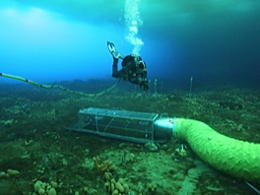
Theme 2: Open Water and Under Ice Foodwebs
Building our understanding of environmental controls on marine life, ranging from pelagic microbes to benthic communities using various sampling platforms, lab-based microbial culture experiments, habitat and life history assessments of mesopelagics, and regional process studies.
Understanding how open water and sea ice microbial food webs respond to environmental change will be central to this study, which will include an assessment of the vulnerability of under-ice benthic communities to ocean acidification.
Together, they will inform the potential wider ramifications of shifts in the flows of energy between feeding levels within ecosystems, and modification of biogeochemical cycles.
To do this, researchers will:
- Develop a suite of tools to capitalise on recent (profiling floats with biological sensors) and emerging (under-ice vehicles) technologies that advance exploration of the relationship between environmental conditions and distributions and composition of microbial foodwebs, in open water and sea ice;
- Conduct a systematic suite of laboratory studies, using conventional methods and novel environmental sensor arrays, to better understand how changes in sea ice extent and thickness will alter the dominance of sea ice versus open water microbial foodwebs;
- Initiate the first community-level assessment of how ocean acidification affects the productivity and sustainability of Antarctic benthic and microbial species, and the consequent effects on ecosystem performance. This centres on the
FOCE
experiment on benthic communities undertaken at Casey, Antarctica in summer 2014-15; and
- Develop better quantification of the energy pathways mediated by mesopelagics that link plankton to fish and marine mammals to provide the comprehensive 'end-to-end' foodweb research outputs.
Interested in working with this team? PhD Scholarships available now.

